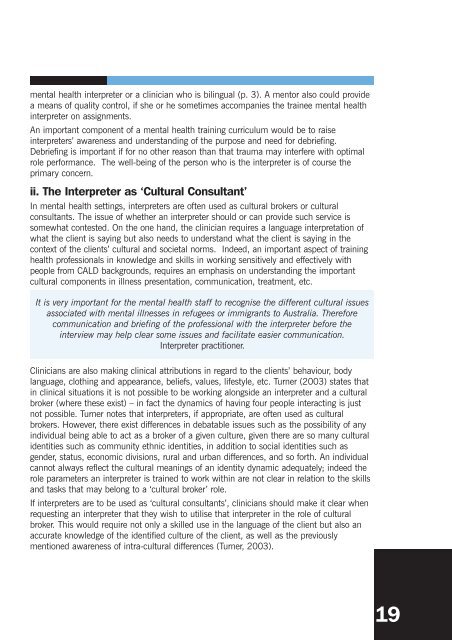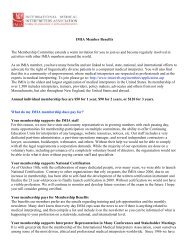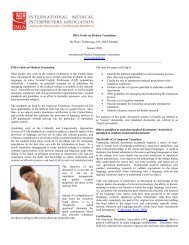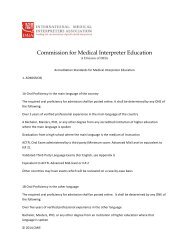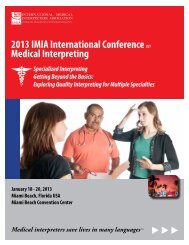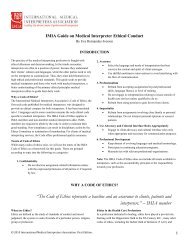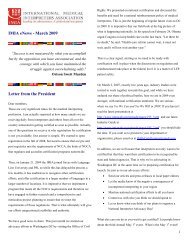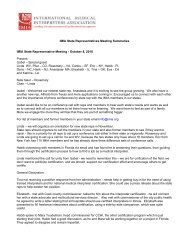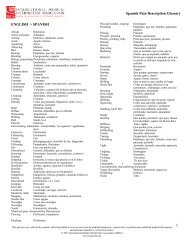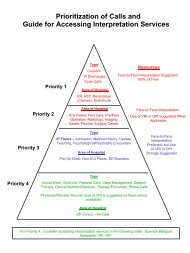improving the quality of mental health interpreting in victoria
improving the quality of mental health interpreting in victoria
improving the quality of mental health interpreting in victoria
You also want an ePaper? Increase the reach of your titles
YUMPU automatically turns print PDFs into web optimized ePapers that Google loves.
<strong>mental</strong> <strong>health</strong> <strong>in</strong>terpreter or a cl<strong>in</strong>ician who is bil<strong>in</strong>gual (p. 3). A mentor also could provide<br />
a means <strong>of</strong> <strong>quality</strong> control, if she or he sometimes accompanies <strong>the</strong> tra<strong>in</strong>ee <strong>mental</strong> <strong>health</strong><br />
<strong>in</strong>terpreter on assignments.<br />
An important component <strong>of</strong> a <strong>mental</strong> <strong>health</strong> tra<strong>in</strong><strong>in</strong>g curriculum would be to raise<br />
<strong>in</strong>terpreters’ awareness and understand<strong>in</strong>g <strong>of</strong> <strong>the</strong> purpose and need for debrief<strong>in</strong>g.<br />
Debrief<strong>in</strong>g is important if for no o<strong>the</strong>r reason than that trauma may <strong>in</strong>terfere with optimal<br />
role performance. The well-be<strong>in</strong>g <strong>of</strong> <strong>the</strong> person who is <strong>the</strong> <strong>in</strong>terpreter is <strong>of</strong> course <strong>the</strong><br />
primary concern.<br />
ii. The Interpreter as ‘Cultural Consultant’<br />
In <strong>mental</strong> <strong>health</strong> sett<strong>in</strong>gs, <strong>in</strong>terpreters are <strong>of</strong>ten used as cultural brokers or cultural<br />
consultants. The issue <strong>of</strong> whe<strong>the</strong>r an <strong>in</strong>terpreter should or can provide such service is<br />
somewhat contested. On <strong>the</strong> one hand, <strong>the</strong> cl<strong>in</strong>ician requires a language <strong>in</strong>terpretation <strong>of</strong><br />
what <strong>the</strong> client is say<strong>in</strong>g but also needs to understand what <strong>the</strong> client is say<strong>in</strong>g <strong>in</strong> <strong>the</strong><br />
context <strong>of</strong> <strong>the</strong> clients’ cultural and societal norms. Indeed, an important aspect <strong>of</strong> tra<strong>in</strong><strong>in</strong>g<br />
<strong>health</strong> pr<strong>of</strong>essionals <strong>in</strong> knowledge and skills <strong>in</strong> work<strong>in</strong>g sensitively and effectively with<br />
people from CALD backgrounds, requires an emphasis on understand<strong>in</strong>g <strong>the</strong> important<br />
cultural components <strong>in</strong> illness presentation, communication, treatment, etc.<br />
It is very important for <strong>the</strong> <strong>mental</strong> <strong>health</strong> staff to recognise <strong>the</strong> different cultural issues<br />
associated with <strong>mental</strong> illnesses <strong>in</strong> refugees or immigrants to Australia. Therefore<br />
communication and brief<strong>in</strong>g <strong>of</strong> <strong>the</strong> pr<strong>of</strong>essional with <strong>the</strong> <strong>in</strong>terpreter before <strong>the</strong><br />
<strong>in</strong>terview may help clear some issues and facilitate easier communication.<br />
Interpreter practitioner.<br />
Cl<strong>in</strong>icians are also mak<strong>in</strong>g cl<strong>in</strong>ical attributions <strong>in</strong> regard to <strong>the</strong> clients’ behaviour, body<br />
language, cloth<strong>in</strong>g and appearance, beliefs, values, lifestyle, etc. Turner (2003) states that<br />
<strong>in</strong> cl<strong>in</strong>ical situations it is not possible to be work<strong>in</strong>g alongside an <strong>in</strong>terpreter and a cultural<br />
broker (where <strong>the</strong>se exist) – <strong>in</strong> fact <strong>the</strong> dynamics <strong>of</strong> hav<strong>in</strong>g four people <strong>in</strong>teract<strong>in</strong>g is just<br />
not possible. Turner notes that <strong>in</strong>terpreters, if appropriate, are <strong>of</strong>ten used as cultural<br />
brokers. However, <strong>the</strong>re exist differences <strong>in</strong> debatable issues such as <strong>the</strong> possibility <strong>of</strong> any<br />
<strong>in</strong>dividual be<strong>in</strong>g able to act as a broker <strong>of</strong> a given culture, given <strong>the</strong>re are so many cultural<br />
identities such as community ethnic identities, <strong>in</strong> addition to social identities such as<br />
gender, status, economic divisions, rural and urban differences, and so forth. An <strong>in</strong>dividual<br />
cannot always reflect <strong>the</strong> cultural mean<strong>in</strong>gs <strong>of</strong> an identity dynamic adequately; <strong>in</strong>deed <strong>the</strong><br />
role parameters an <strong>in</strong>terpreter is tra<strong>in</strong>ed to work with<strong>in</strong> are not clear <strong>in</strong> relation to <strong>the</strong> skills<br />
and tasks that may belong to a ‘cultural broker’ role.<br />
If <strong>in</strong>terpreters are to be used as ‘cultural consultants’, cl<strong>in</strong>icians should make it clear when<br />
request<strong>in</strong>g an <strong>in</strong>terpreter that <strong>the</strong>y wish to utilise that <strong>in</strong>terpreter <strong>in</strong> <strong>the</strong> role <strong>of</strong> cultural<br />
broker. This would require not only a skilled use <strong>in</strong> <strong>the</strong> language <strong>of</strong> <strong>the</strong> client but also an<br />
accurate knowledge <strong>of</strong> <strong>the</strong> identified culture <strong>of</strong> <strong>the</strong> client, as well as <strong>the</strong> previously<br />
mentioned awareness <strong>of</strong> <strong>in</strong>tra-cultural differences (Turner, 2003).<br />
19


